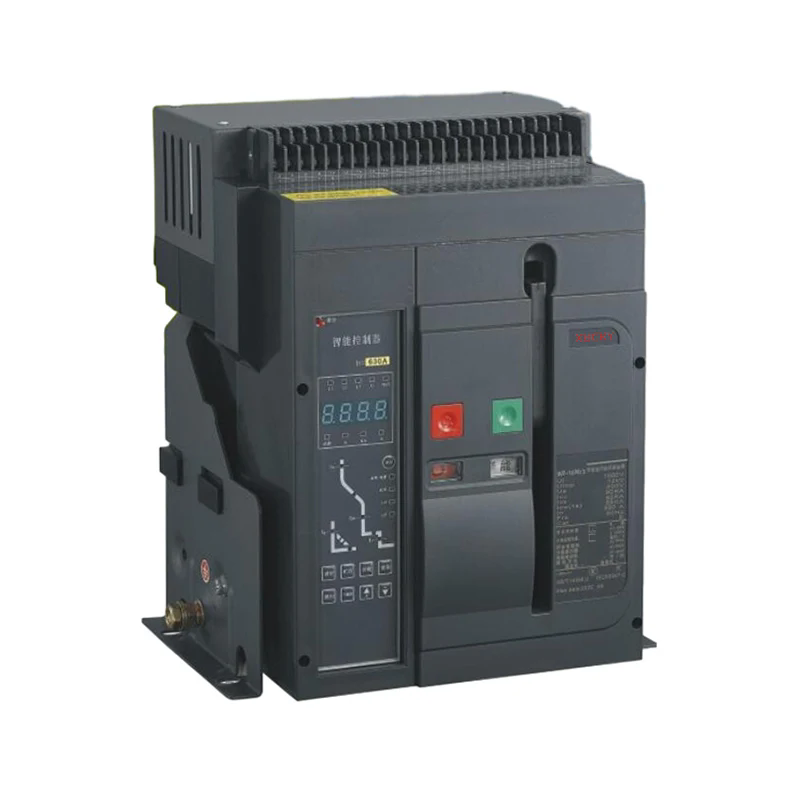What Is an Air Circuit Breaker and Why Is It Essential for Electrical Safety?
2024-11-20
When it comes to electrical systems, safety is of paramount importance. Whether it's in industrial settings, commercial buildings, or even residential homes, the need for reliable protection against electrical faults is crucial. This is where an Air Circuit Breaker (ACB) comes into play. But what exactly is an air circuit breaker, and why is it considered an essential component in electrical systems? Let’s explore its functions, benefits, and why it’s indispensable for electrical safety.
What Is an Air Circuit Breaker?
An Air Circuit Breaker (ACB) is a type of electrical switch designed to protect electrical circuits from damage caused by overcurrent or short circuits. Unlike other types of circuit breakers that use oil or gas for arc extinguishing, ACBs use air as the medium to extinguish the electrical arc when the circuit is interrupted.
When an overcurrent or short circuit occurs, the ACB automatically disconnects the faulty circuit from the power supply, preventing further damage to the wiring and electrical components. It works by creating an arc between the contacts as the circuit is broken, and the air surrounding the arc helps to cool and extinguish it. This process ensures that the electrical system remains safe and operational even under fault conditions.
How Does an Air Circuit Breaker Work?
Air circuit breakers operate based on a relatively simple principle: when a fault occurs, the breaker’s contacts open, and an electric arc forms. The key feature of the ACB is the arc extinction process. The air surrounding the arc absorbs the heat generated, cooling it rapidly and preventing the arc from sustaining itself. As the contacts continue to open, the arc is extinguished, and the circuit is safely disconnected.
The breaker also contains a mechanism for resetting and re-establishing the connection once the fault is cleared, ensuring that the electrical system can be restored to normal operation.
Why Are Air Circuit Breakers Important?
1. Protection Against Overcurrent and Short Circuits
The primary function of an ACB is to protect electrical circuits from damage caused by overcurrent or short circuits. Overcurrent can occur when there is an excessive flow of electricity, while short circuits happen when electrical paths unintentionally connect, creating a surge of current. Without protection, these conditions can cause fires, equipment damage, or even electrocution. An air circuit breaker provides an efficient means of disconnecting the circuit before the damage occurs.
2. Prevents Equipment Damage
When a short circuit or overcurrent happens, electrical equipment like motors, transformers, and wiring can suffer significant damage. ACBs protect sensitive equipment by quickly cutting off the electrical supply, minimizing the risk of costly repairs or replacements. This is especially important in industrial and commercial settings, where expensive machinery is involved.
3. Reliability and Safety
Air circuit breakers are designed to handle high electrical currents and harsh conditions. They are highly reliable, providing protection in both low-voltage and high-voltage applications. They are especially important in areas where electrical systems need to function continuously without interruptions, ensuring both the safety of people and the protection of property.
4. Ease of Maintenance
One of the advantages of ACBs is their ease of maintenance. Since they use air to extinguish arcs, they do not require the same level of upkeep as oil or gas-based circuit breakers. Additionally, they are designed to be easily reset after a fault occurs, allowing the system to return to normal operations quickly without extensive downtime.
Where Are Air Circuit Breakers Used?
Air circuit breakers are commonly used in a variety of settings, including:
1. Industrial and Manufacturing Facilities
ACBs are essential in large factories or manufacturing plants where heavy machinery operates continuously. These environments are often at risk of power surges or short circuits due to the large amount of electrical equipment. ACBs offer a reliable solution to protect both the workers and the machinery from electrical hazards.
2. Commercial Buildings
In commercial spaces like shopping malls, office buildings, or hospitals, the need for continuous power is crucial. ACBs ensure that the electrical systems remain safe from faults, preventing system failures and protecting electrical infrastructure.
3. Power Distribution Systems
In power distribution networks, ACBs are used to protect transformers, substations, and distribution lines. They help maintain stability in the power grid by disconnecting faulty circuits and preventing widespread power outages.
4. Residential Buildings
Although less common in residential settings, ACBs are still used in some large homes or luxury buildings where electrical systems are more complex. They provide an extra layer of protection in case of electrical faults.
What Are the Key Benefits of Using Air Circuit Breakers?
1. High Breaking Capacity
Air circuit breakers are known for their high breaking capacity, meaning they can safely interrupt the flow of electricity even under heavy fault conditions. This capability makes them an ideal choice for high-voltage applications, where more powerful protection is needed.
2. Compact Design
Despite their ability to handle large amounts of electrical current, air circuit breakers are relatively compact. Their size makes them suitable for installations where space is limited, such as in control panels or switchgear.
3. Cost-Effectiveness
Compared to other types of circuit breakers, air circuit breakers are often more affordable and easier to maintain. They do not require expensive maintenance procedures or replacement of the arc extinguishing medium, making them a cost-effective choice for many applications.
4. Environmentally Friendly
Since ACBs use air instead of oil or gas, they are more environmentally friendly and less likely to pose any environmental risks in the event of a failure or leak. This makes them a more sustainable option for those looking to minimize their environmental footprint.
Conclusion: Why Are Air Circuit Breakers Crucial for Electrical Systems?
In conclusion, an air circuit breaker is a vital component for protecting electrical systems from faults such as overcurrents and short circuits. Its ability to safely interrupt electrical flow, protect equipment, and ensure the safety of people makes it indispensable for both industrial and commercial electrical systems. Whether you’re running a factory or maintaining a power distribution network, air circuit breakers are a reliable, cost-effective, and environmentally friendly solution that ensures the long-term health of your electrical infrastructure. So, the next time you think about electrical safety, remember the crucial role that an air circuit breaker plays in keeping systems running smoothly and securely.



